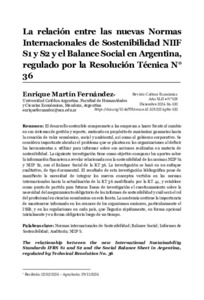Por favor, use este identificador para citar o enlazar este ítem:
https://repositorio.uca.edu.ar/handle/123456789/20624| Título: | La relación entre las nuevas Normas Internacionales de Sostenibilidad NIIF S1 y S2 y el Balance Social en Argentina, regulado por la Resolución Técnica N° 36 | Autor: | Fernández, Enrique Martín | Palabras clave: | AUDITORIA; NORMAS INTERNACIONALES; SOSTENIBILIDAD | Fecha de publicación: | 2024 | Editorial: | Pontificia Universidad Católica Argentina. Facultad de Ciencias Económicas. Centro de Estudios en Economía y Cultura | Resumen: | El desarrollo sostenible compromete a las empresas a hacer frente al cambio en sus sistemas de gestión y reporte, mutando su propósito de maximizar ganancias hacia la creación de valor económico, social y ambiental, así como al gobierno corporativo. Se considera importante abordar el problema que se plantea en las organizaciones al definir las herramientas a utilizar para informar sobre sus acciones realizadas en materia de sostenibilidad. La siguiente investigación tiene como objetivo comparar los aportes sobre la información financiera a revelar relacionada con la sostenibilidad de las normas NIIF S1 y NIIF S2, con el Balance Social de la RT 36. La investigación se basó en un enfoque cualitativo, de tipo documental. El resultado de esta investigación bibliográfica pone de manifiesto la necesidad de integrar los nuevos conceptos vertidos en las normas internacionales hacia la actualización de la RT 36 modificada por la RT 44, y establece como punto de partida para futuras líneas de investigación el cuestionamiento sobre la necesidad del aseguramiento obligatorio de los informes de sostenibilidad y cuál será el rol del profesional en ciencias económicas en esta faceta. La academia sostiene la importancia de mantenerse informado en los avances de los organismos emisores, particularmente el ISSB, y en las regulaciones en cada país, que llegarán rápidamente, en forma opcional inicialmente y en forma obligatoria luego de un tiempo. Sustainable development commits companies to confront changes in their management and reporting systems, shifting their purpose from maximizing profits to creating economic, social, and environmental value, as well as corporate governance. It is considered important to address the problem organizations face when defining the tools to be used to report on their sustainability actions. The aim of the following research is to compare the contributions of the financial information to be disclosed regarding sustainability according to IFRS S1 and IFRS S2 standards, with the Social Balance of RT 36. The research was based on a qualitative, documentary approach. The result of this bibliographic research highlights the need to integrate the new concepts introduced by international standards into the update of RT 36 modified by RT 44, and establishes the questioning about the necessity of mandatory assurance of sustainability reports as a starting point for future lines of research. It also considers the role of professionals in economic sciences in this facet. The academic community stresses the importance of staying informed about the progress of issuing organizations, particularly the ISSB, and about regulations in each country, which will initially arrive as optional and later become mandatory after some time. |
URI: | https://repositorio.uca.edu.ar/handle/123456789/20624 | ISSN: | 1852-5342 | Derechos: | Atribución-NoComercial-CompartirIgual 4.0 Internacional | Fuente: | Revista Cultura Económica. 2024, 42(108) |
| Aparece en las colecciones: | CECON - 2024 Año XLII nro. 1O8 |
Ficheros en este ítem:
| Fichero | Descripción | Tamaño | Formato | |
|---|---|---|---|---|
| relacion-nuevas-normas.pdf | 338,32 kB | Adobe PDF |  Visualizar/Abrir |
Este ítem está sujeto a una Licencia Creative Commons

